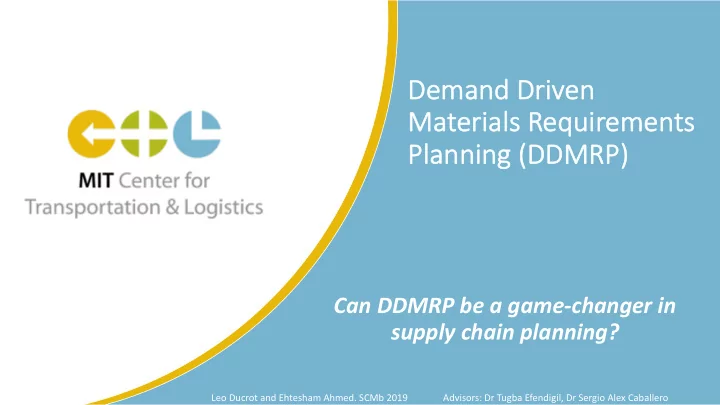

Dema Demand Dr Driven en Ma Materi rials Requi quirements ts Plan Plannin ing (D (DDMRP) P) Can DDMRP be a game-changer in supply chain planning? Leo Ducrot and Ehtesham Ahmed. SCMb 2019 Advisors: Dr Tugba Efendigil, Dr Sergio Alex Caballero
Sponsors Advanced Planning System Provider Institute developing and promoting DDMRP Industrial partner (investigating DDMRP)
Motivation: Can DDMRP be a game changer? DDMRP average result : -20% 13% -48% service level inventory leadtime reduction Can these numbers be achieved in all industries?
Motivation: Can DDMRP be a game changer? Financial impact: inventory service level leadtime reduction ROI
What is DDRMP? DDMRP is a multi-echelon supply chain planning approach that combines the best of lean, MRP, six-sigma and the theory of constraints Position Protect Pull 4 5 2 3 1 Strategic Demand Execution Buffer Dynamic driven and buffer profiles adjustments planning priorities positioning
What is DDMRP? Coupled MRP Decoupled DDMRP DDMRP Leverages decouplingpoints to make the planning problem easier !
What is DDMRP?: Inventory buffers Top Of Green Order volume Define the order size and 80 the order frequency Top Of Yellow Provides inventory over 100 lead time Top Of Red 50 Protect against variability Buffer levels (in product unit)
What is DDMRP?: Run chart Example of DDMRP run chart Volume product unit Time (days) Sum of TOPOFGREEN Sum of TOPOFYELLOW Sum of TOPOFRED Sum of NETFLOWPOSITION
What is in for me? Could that work in my company ?
Problem Setting and Research Question DDMRP uses decoupled points to create a more stable and suitable environment for MRP. Would that bring better results than a APS? Capacity Constraint Sourcing decision Shelf-life Constraint Research Question: What would be the added value of DDMRP in finite capacity planning under uncertainty?
Methodology Qualitative/ Quantitative part : What Simulation analysis : Let’s compare was the impact of DDMRP on companies that KPIs of plans made with APS and DDMRP implemented it? Inventory turn Service Level Interviews : A few Survey : Many Simulation : Comparing APS companies, in-depth companies, targeted and DDMRP in a controlled investigation questions environment
Could it work for my company: Size Annual > $10 B <= $100 M > $100M <= $500M revenues 17% 46% 29% Proportion
Could it work for my company: Legacy system MRP APS 23% 7% service level -23% -13% inventory -55% -26% Customer lead time
Could it work for my company: Maturity level 6% 23% service level -16% -22% inventory -29% -47% Customer lead time
Could it work for my company? It looks like it is applied everywhere!
Could it work for my company? Can DDMRP handle my operational constraints?
Could it work for my company: Sourcing decisions Respondents with sourcing All respondents Sourcing decision decisions Moderately 27% 38% Effective 54% 46% Effective
Could it work for my company: shelf-life limitations Respondents with shelf-life All respondents Shelf-life Constraint limitations Moderately 29% 38% Effective 42% 46% Effective
Could it work for my company: Finite capacity Capacity constraints All respondents Capacity Constraint respondents Moderately 15% 18% Effective 58% 73% Effective
Could it work for my company: DDMRP or APS Optimal corner DDMRP outperforms the Service Level VS Inventory Turns Scenario 1 heuristic-based planning 100.0% 95.0% Results are similar to the APS Heuristic Scenario 1 90.0% APS Solver Scenario 1 solver DDMRP Scenario 1 85.0% Less capacity 80.0% DDMRP is more robust to 0 20 40 60 80 100 120 capacity constraint than Service Level VS Inventory Turns Scenario 2 100.0% the heuristic 95.0% APS Heuristics Scenario 2 The solver is overall more 90.0% APS Solver Scenario 2 DDMRP Scenario 2 85.0% robust 80.0% 0 20 40 60 80 100 120
Could it work for my company: DDMRP or APS DDMRP outperforms the Service Level VS Inventory Turns Scenario 3 100.0% heuristic-based planning 95.0% APS Heuristic Scenario 3 Results are similar to the 90.0% APS Solver Scenario 3 DDMRP Scenario 3 solver 85.0% Less capacity 80.0% 0 20 40 60 80 100 120 The solver is overall more Service Level VS Inventory Turns Scenario 4 robust 100.0% 95.0% APS Heuristics Scenario 4 90.0% APS Solver Scenario 4 DDMRP Scenario 4 85.0% 80.0% 0 20 40 60 80 100 120
Could it work for my company: DDMRP or APS APS heuristic APS solver DDMRP KPIs Easy to understand Easy to maintain Non-trivial solutions Operational constraints
DDMRP and the operations Graph showing the frequency of the answer Improvements in the operations with DDMRP 100% 80% 60% 40% 20% 0% Planning Clear Better control Smoother Relevant Stability priorities over the dependent information operations requirements Agree Neither Agree nor Disagree Disagree Cannot Say
DDMRP streamlines operations Education program across the company Educate everyone on the basic of flow Align objectives DDMRP implementations lead to streamlined operations across the internal supply chain
Could it work for my company? It seems like DDMRP can handle complex operational constraints!
Conclusion: What is the added value of DDMRP? Easy planning method that can have a positive financial impact and provides a competitive edge Provides results similar to a mathematical solver Streamline the operations
? A Do Do you have e any y questi tion? lduc lducro rot@mit it.e .edu du ea eahmed ed@mit. t.ed edu
Literature review: Current state Current literature available MRP APS DDMRP 1965 1990’s 2011 Project scope PhD thesis
Problem setting: DDMRP planning principles Cumulative leadtime Long time future Order book 300 250 Quantity to 70 replenish 200 300 150 250 120 70 100 200 Adapt the system (Portfolio, 50 150 80 capacity, buy-make) to the 120 desired future 0 100 Set up buffers according 50 80 to anticipated future Only use Customer order 0 Use forecasts
Problem setting: Hypothesis of MRP MRP requires stable demand signal and low operational variability. DDMRP MRP/APS Multiple decoupled plans 1 coupled plan Long leadtimes Shorter (decoupled) leadtime Variability passed on Reduced variability between levels Hypothesis are no longer valid Hypothesis are no longer valid
Recommend
More recommend